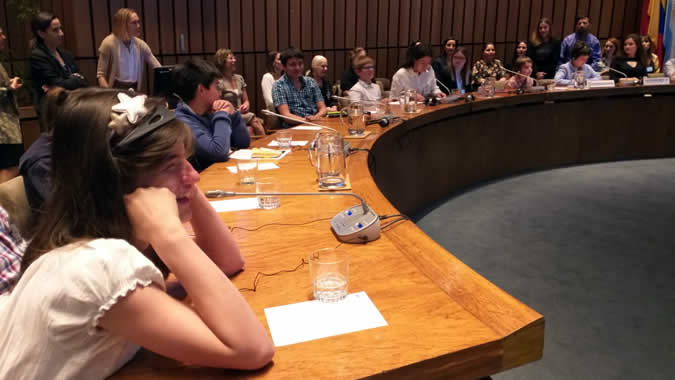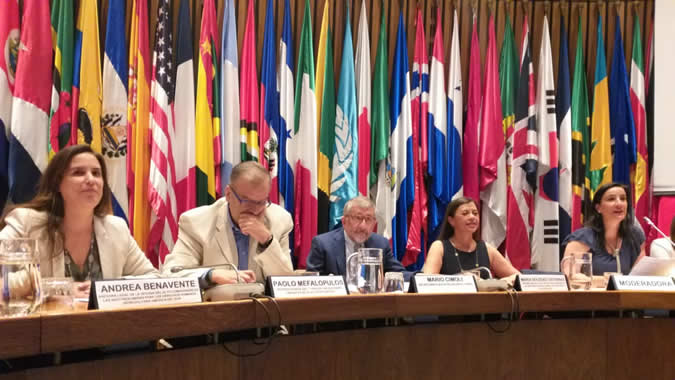A Week of Inclusion Took Place at ECLAC with the Participation of People with Disabilities in Diverse Activities
Work area(s)
A highlight was the launch of the website of the global campaign for the good treatment of girls, boys and adolescents with disabilities, an initiative led by the United Nations Secretary-General’s Special Envoy, María Soledad Cisternas.

A “Week of Inclusion” was held on December 2-6, 2019 at the headquarters of the Economic Commission for Latin America and the Caribbean (ECLAC) in Santiago, Chile, and included a series of activities in which boys, girls, adolescents and adults with disabilities participated.
The objective of the Week of Inclusion – held in the framework of the International Day of Persons with Disabilities, which is celebrated each year on December 3 – is to raise awareness about the contributions that people with distinct disabilities make to our societies and the barriers they face to achieving the full exercise of their rights.
On Monday, December 2, the photography exhibit “Eyes that do not see” – by the acclaimed Chilean artist Paz Errázuriz, recipient of the National Plastic Arts Prize 2017, and with text by biologist Jorge Díaz – was inaugurated. Errázuriz herself presented the exhibition mounted in one of the hallways of ECLAC’s main building in Santiago.
“’Eyes that do not see’ is an interdisciplinary project involving science, philosophy and poetry that a feminist photographer and an activist biologist carried out in order to find a path towards blindness that could speak to us about our present,” the authors describe.
On Tuesday, December 3, Fundación Luz (which works with people who are blind or have limited vision) delighted ECLAC’s staff with the repertoire of its Sounds of Light Orchestra (Orquesta Sonidos de Luz), which performed in the building’s courtyards, as in past years. On Wednesday and Thursday, Fundación Luz also offered massage therapy services and sold artisanal products.
Meanwhile, the website of the global campaign for the good treatment of girls, boys and adolescents with disabilities, www.my10principles.com, was launched on Wednesday, December 4. This is an initiative of the Office of the Special Envoy of the United Nations Secretary-General on Disability and Accessibility, María Soledad Cisternas.
During the event, a group of boys, girls and adolescents from Chile, with and without disabilities, read the campaign’s 10 principles in Spanish, English, French, German, Italian and Mapuzungún (the language of the Mapuche indigenous people). The first principle states “I exist as I am. And I am a person just like you,” while the tenth principle expresses: “It matters to me that you believe me. I need to be trusted just like you.”
The launch was led by María Soledad Cisternas and Mario Cimoli, ECLAC’s Deputy Executive Secretary, acting on behalf of Executive Secretary Alicia Bárcena. Other participants included officials from UNICEF (the United Nations Children’s Fund) and the OHCHR (the Regional Office of the United Nations High Commissioner for Human Rights), as well as national authorities and representatives of civil society. See related news here (in Spanish).
It is estimated that 12% of the population of Latin America and the Caribbean has some kind of disability, which represents around 70 million people. A high percentage of girls, boys and adolescents with disabilities in the region are subjected to diverse forms of discrimination and other grave violations of their human rights, in areas such as access to education, health, recreation, information and communication, and participation. These violations have negative effects on their physical, mental and social development, hampering their full, equal and effective participation and their contributions to society, ECLAC sustains.
It is necessary to put an end to the stereotypes, segregation and marginalization, overprotection, lack of accessibility and lack of services and support in order to build inclusive societies with environments that are conducive and favorable to this population group’s development and empowerment, the Commission indicates. Only in this way will it be possible to move towards the goal of full equality and effective respect for the rights of all people, leaving no one behind.
Related content

Se lanzó en CEPAL sitio web de la campaña global para el buen trato de niñas, niños y adolescentes con discapacidad
María Soledad Cisternas, Enviada Especial del Secretario General de la ONU sobre la discapacidad y la accesibilidad, y Mario Cimoli, Secretario Ejecutivo Adjunto de la Comisión, encabezaron el evento…
Type
Country(ies)
- Latin America and the Caribbean
Contact
Public Information Unit
- prensa@cepal.org
- (56 2) 2210 2040